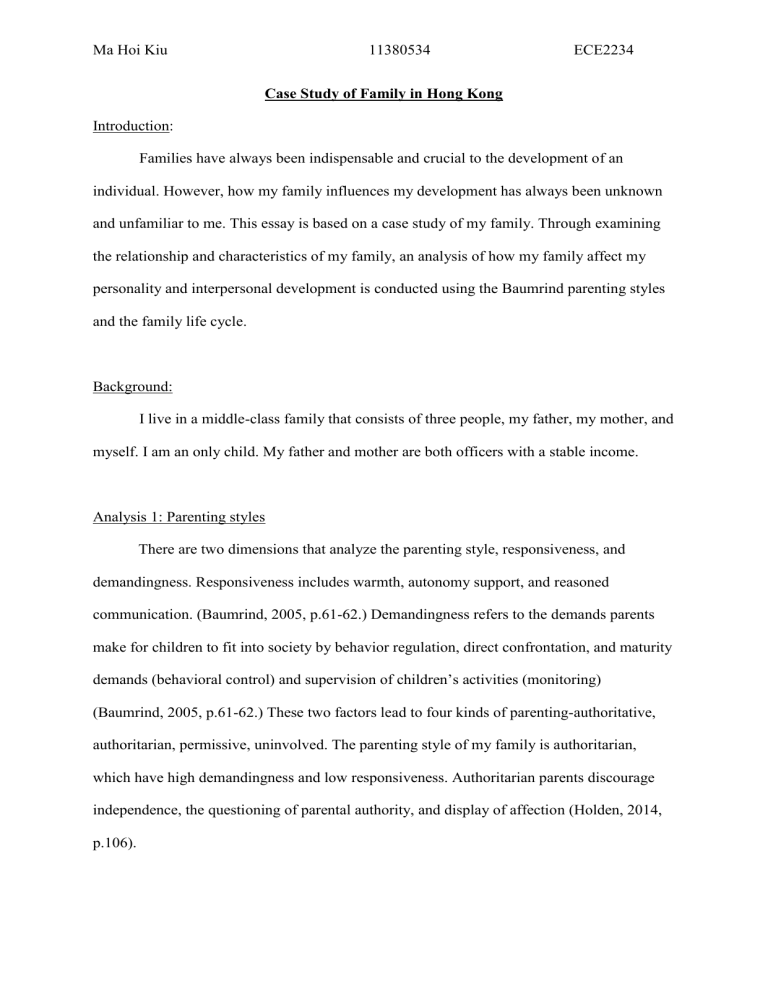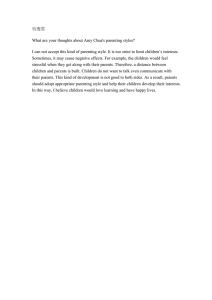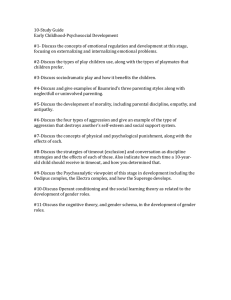
Ma Hoi Kiu 11380534 ECE2234 Case Study of Family in Hong Kong Introduction: Families have always been indispensable and crucial to the development of an individual. However, how my family influences my development has always been unknown and unfamiliar to me. This essay is based on a case study of my family. Through examining the relationship and characteristics of my family, an analysis of how my family affect my personality and interpersonal development is conducted using the Baumrind parenting styles and the family life cycle. Background: I live in a middle-class family that consists of three people, my father, my mother, and myself. I am an only child. My father and mother are both officers with a stable income. Analysis 1: Parenting styles There are two dimensions that analyze the parenting style, responsiveness, and demandingness. Responsiveness includes warmth, autonomy support, and reasoned communication. (Baumrind, 2005, p.61-62.) Demandingness refers to the demands parents make for children to fit into society by behavior regulation, direct confrontation, and maturity demands (behavioral control) and supervision of children’s activities (monitoring) (Baumrind, 2005, p.61-62.) These two factors lead to four kinds of parenting-authoritative, authoritarian, permissive, uninvolved. The parenting style of my family is authoritarian, which have high demandingness and low responsiveness. Authoritarian parents discourage independence, the questioning of parental authority, and display of affection (Holden, 2014, p.106). Ma Hoi Kiu 11380534 ECE2234 In my personality development perspective, since my parents always have high expectations that I am not capable to attain, their disappointment became an overwhelming fear and anxiety for me when I fail to achieve a certain goal or follow a plan. Hence I became spontaneous and seldom set plans or goals for myself to avoid the pressure of failure and disappointment. I also give up easily as my parents give me the sense that no matter how hard I tried, it will never be enough as I am unable to fulfill their expectations. Therefore, I often give up trying when encountering challenges as even if I did, I would not succeed. My parents always have high expectations of me. They want me to have excellent performance in academics and pursue medics in university. Extreme disappointment would be expressed when I cannot reach their expectations, even if I have done my best. An example of this being I did very well in an English exam one time. Nevertheless, when I show my report card to my parents, they were mad and disappointed because my Mathematics performance was average. They did not acknowledge my English performance at all. My parents tend to reserve their emotions and feelings. Hence, they seldom express it to me verbally or physically. They never discuss any matter with me and makes decisions for me most of the time. There is no negotiation or discussion allowed and they expect me to listen. These behaviors of high-expectation, emotional-distancing, one-way conversation are the factors of authoritarian parenting style. (Baumrind, 1991). In my social perspective, as I cannot receive affection, approval, and validation from my parents, I became a people-pleaser in hopes of gaining affection and closeness from my peers. Though, I have anxiety when I first encounter or getting close to someone, as I have the fear of not being able to live up to their expectation of me. Which is similar to how I cannot live up to my parent's expectations. In. a social group, I tend to be the more reserved and passive role. I seldom express my ideas and thoughts as I prefer following and agreeing with other's thoughts and decisions. This is Ma Hoi Kiu 11380534 ECE2234 because I got used to following my parent's orders and expressing my opinion and disagreement is not allowed. Analysis 2: The Family Life Cycle According to McGoldrick & Carter (1999), the main concept of family life as the relationships with family members undergo transition while moving along the life cycle. Boundaries and psychological distance among members change. The role within and between subsystems are constantly being redefined. There are six major transition stages, which is Leaving Home: Single Young Adulthood, The joining of families in marriage: the new couple, Families with young children, Families with adolescents, Families at midlife: launching children & moving on and Families in the later life. The family with young children stage was the previous transition my family went through. In the family with young children stage, which is when I was age 5 to age 6 parents need to accept new members into the system and prepare for great changes. adjust the marital system to make space for children, join in child-rearing, financial & household tasks (McGoldrick & Carter, 1999). As children are more mature at this age, this period would increase the cooperative parent-child relationship. (Holden, 2014). It is also a transition from the safety of home to the challenges from the outside world (Grusec, Chaparro, Johnson, & Sherman, 2013.) There is two main focus during this period, which is the support that includes involvement, warmth, responsiveness, acceptance, and emotional availability and behavior control to regulate children's behaviors. (Holden, 2014, p.235) In my personality development perspective, as I have working parents, my parents hired maids to take care of me during my middle childhood. Without my parent's presence to Ma Hoi Kiu 11380534 ECE2234 support me through the transition to unfamiliar environments. When I first shift from kindergarten to primary school, they were too busy working and seldom bring me to school or pick me up. I developed anxiety when transitioning to new places, like when I transfer from primary school to secondary school and to university. I clung to the old environment for a long time so It is difficult for me to adapt and adjust to a new environment. I also became attention-seeking and needy. I crave attention and affection and started to misbehave intentionally to gain their attention. As for my social development, I became more sociable to make more friends since I was often alone without my parent's accompany at home. Our family is currently undergoing the Families with adolescents stage and I am in the late adolescence period, which is 18 years old to early 20s (Smetana, Campione-Barr, & Metzger, 2006). In the families with adolescents stage, parents need to increase the flexibility of family boundaries to permit children’s independence. There is also a shift of parent and child relationships to permit adolescents to move into and out of the system. (Mcgoldrick & Carter, 1999). As adolescents are starting to transition to the roles and responsibilities of grown-ups. Parents should e responsive to the adolescents' changes in cognitive, physical, self-concept, and social. Adolescents are becoming more autonomous and independent. At the same time, parents should establish a close adolescent–parent relationship for emotional support while setting boundaries different from families with younger children and remain an open and trusting attitude towards their children (McGoldrick & Shibusawa, 2012). During this period, the interpersonal equilibrium built with parents has often been disrupted (Holden, 2014). In recent 2-3 years, my relationship with the parent is at the lowest point, because cognitive change increases my desire for responsibilities and independence (Holden, 2014). Ma Hoi Kiu 11380534 ECE2234 Though, my parents are used to the authoritarian parenting style. They are still reluctant to respect my individuality, privacy, views, and autonomy. They would try to look through my phone and control what I study in university. Therefore, instead of obeying and following my parents' authority and rules, I started to challenge their control. For my personality development, I became rebellious. I often initiate arguments and conflicts and started to question their rules. I would not respond to their messages and come home later than curfew. For my social development, due to their authoritarian parenting style, They could not offer me a positive and warm relationship with supportive conversation and emotional support that I needed in this challenging and confusing period. It is difficult for me to talk and share with them my negative emotion and the struggles that I am experiencing. Hence, I became dependent and reliant on my friends and boyfriend. I am very attached to them, especially my boyfriend. I talk to my friends about my feelings and issues and they offer me support and advice instead of judgment from my parents. My boyfriend offers me comfort, warmth, laughter, and safety during this stressful period. Conclusion: After the analysis, I have a deeper understanding of how my parents affect my development and I realized the issue in my family. In the future, I would like to rebuild a better relationship with my parents. I will try to be more open and express my feelings to let them know my struggle in this family. Though their parenting style is not the best, I believe that they are expressing their love and care in their own way. Ma Hoi Kiu 11380534 ECE2234 References Baumrind, D. (2005). Patterns of parental authority and adolescent autonomy. New Directions for Child and Adolescent Development, 2005(108), 61-69. Baumrind, D. (1991). The influence of parenting style on adolescent competence and substance use. The Journal of Early Adolescence, 11(1), 56-95. Holden, G. (2014). Parenting : A dynamic perspective (2nd ed.). McGoldrick, M., Carter, E. A., & Garcia-Preto, N. (Eds.). (1999). The expanded family life cycle: Individual, family, and social perspectives. Allyn and Bacon. McGoldrick, M., & Shibusawa, T. (2012). The family life cycle. In F. Walsh (Ed.), Normal family processes: Growing diversity and complexity (p. 375–398). The Guilford Press. Smetana, J. G., Campione-Barr, N., & Metzger, A. (2006). Adolescent development in interpersonal and societal contexts. Annu. Rev. Psychol., 57, 255-284. Grusec, J., Chaparro, M., Sherman, A (2012). Social Development and Social Relationships in Middle Childhood.



